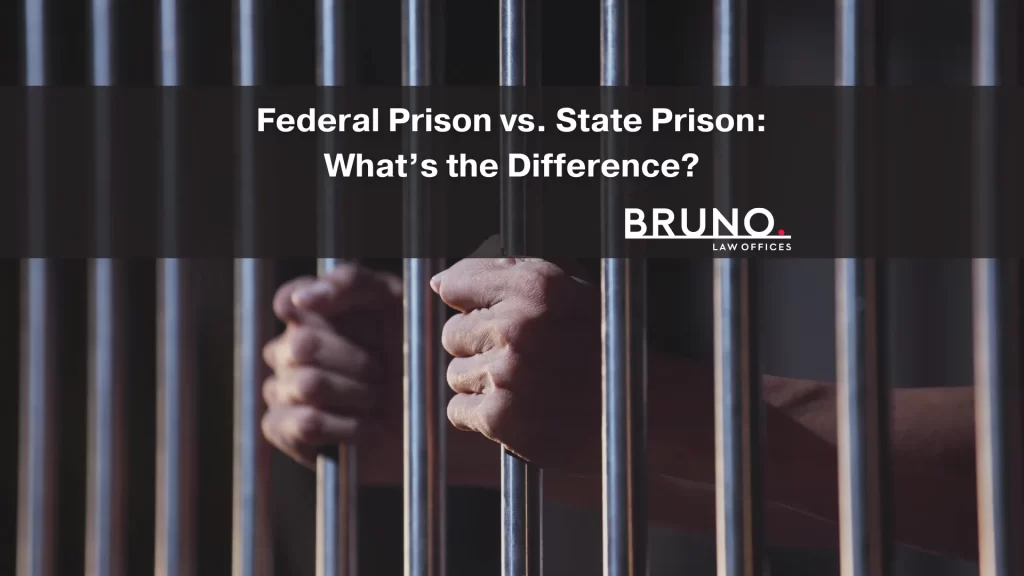Posted on Sunday, October 1st, 2023 at 9:00 am
The criminal justice system can be confusing. The nature of the offense can significantly impact the consequences a person faces and where they will serve their time following a conviction. Federal and state prisons are distinct entities and operate under different jurisdictions. The experience an inmate can receive in a federal prison may also differ from that they would get in a state prison. Understanding the differences can be challenging.
At Bruno Law Offices, our criminal justice team understands that the Illinois criminal justice system can seem overwhelming. Our premier criminal defense team has defended thousands of individuals in state and federal courts. We know how to protect our client’s rights. We can help you understand the distinction between state and federal prisons.
What Is the Difference Between Federal Prison and State Prison?
The most significant difference between the state and federal prison systems is jurisdiction. The federal government operates federal prisons under the direction of the Federal Bureau of Prisons and the U.S. Department of Justice. These institutions operate with five distinct security system levels, including:
- Minimum security
- Low security
- Medium security
- High security
- Administrative security
Federal prisons tend to be safer institutions, in part because they tend to house fewer violent offenders and have fewer numbers of prisoners. Most federal prison terms are also shorter than state prison terms.
State prisons are correctional institutions operated by state governments that house inmates convicted of violating state laws. State prison systems typically only have three security levels, which include:
- Minimum security
- Medium security
- Maximum security
Many state-run prisons house more significant numbers of inmates. These inmates tend to have convictions for violent and dangerous crimes. Terms are longer than federal prison sentences, and inmates are generally assigned duties to complete while incarcerated.
Although state and federal prisons have significant differences, both are funded by taxpayer money and dedicate resources to rehabilitation. Additionally, state and federal governments can contract private companies to run their correctional facilities. As of 2022, 8 percent of the total state and federal prison population were incarcerated in privately run prisons.
Who Goes to Federal Prison? Federal vs. State Crimes
Federal prisons house individuals convicted of violating federal laws and those who cross state lines to engage in illegal actions. Examples of criminal acts that can land an individual in a federal prison tend to include:
- Racketeering
- Mail fraud
- Money laundering
- Drug trafficking
- Specific sex offenses and child pornography
- Immigration crimes
Crimes crossing state lines can also land a person in federal prison. Kidnapping, drug trafficking, and sex offenses that span more than one jurisdiction can lead to incarceration in a federal facility. There are five federal prisons in Illinois and four federal prison camps.
State prisons house inmates convicted of violating state laws. State prisons tend to house criminals convicted of more violent or dangerous crimes, such as:
- Rape
- Murder
- Armed robbery
- Assault
- Theft
Illinois has 28 state prisons. Some are state-run, and private corporations operate others. There are also 92 jails in the state. Jails are not the same as state prisons. State agencies operate state prisons, while cities or counties typically manage jails. Jails also only hold inmates for short periods, typically for sentences under one year.
Defending Against Federal and State Criminal Charges
 Defending against federal or state charges requires extensive experience, legal knowledge, and resources. State and federal crimes are significantly different and may necessitate unique legal procedures and defense strategies. At Bruno Law Offices, our elite criminal defense attorneys have experience navigating state and federal jurisdictions. Criminal cases are highly fact-specific and require aggressive and diligent oversight to build a compelling strategy to achieve the most favorable result possible.
Defending against federal or state charges requires extensive experience, legal knowledge, and resources. State and federal crimes are significantly different and may necessitate unique legal procedures and defense strategies. At Bruno Law Offices, our elite criminal defense attorneys have experience navigating state and federal jurisdictions. Criminal cases are highly fact-specific and require aggressive and diligent oversight to build a compelling strategy to achieve the most favorable result possible.
Our law firm has more than 35 years of legal experience. We know what’s at stake, and whether you are facing state or federal charges, we can help protect your legal rights and fight for you. Our team has successfully defended individuals in state and federal courts, overcoming challenges and navigating the complicated Illinois criminal justice system.
Contact an Illinois Criminal Defense Lawyer Now
There are distinct differences between the state and federal prison systems. However, at the end of the day, your freedom is in jeopardy whether you are facing state or federal charges. At Bruno Law Offices, our Champaign criminal defense attorneys will vigorously and proactively craft a defense plan for you. Don’t talk to law enforcement. Talk to us. You are entitled to legal representation. Contact our Illinois office online or call (217) 328-6000 and request a confidential case review today.
